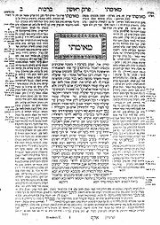
. It takes the form of a record of rabbi
nic discussions pertaining to Jewish law
, ethics
, philosophy, customs and history.
The Talmud has two components: the Mishnah
(c. 200 CE
), the first written compendium of Judaism's Oral Law; and the Gemara
(c. 500 CE), a discussion of the Mishnah and related Tannaitic
writings that often ventures onto other subjects and expounds broadly on the Tanakh
.
The terms Talmud and Gemara are often used interchangeably.
Whoever destroys a soul, it is considered as if he destroyed an entire world. And whoever saves a life, it is considered as if he saved an entire world.
- Babylonian Talmud, Sanhedrin 4:8 (37a)
![]()
If I am not for myself, then who will be for me? And if I am only for myself, then what am I? And if not now, when?
- Rabbi Hillel (Avot 1:14)
![]()
Repent one day before your death. (Avot 2:10)
![]()
Say little and do much. (Avot 1:15)
![]()
Make a teacher for yourself, acquire for yourself a friend, and judge every man to the side of merit. (Avot 1:6)
![]()
In a place where there are no men, strive to be a man. (Avot 2:5)
![]()
Let your home be a meeting place for the wise; dust yourself in the soil of their feet, and drink thirstily of their words. (Avot 1:4)
![]()
Make that His will should be your will, so that He should make your will to be as His will. Nullify your will before His will, so that He should nullify the will of others before your will. (Avot 2:4)
![]()
Rabbi Eliezer would say: The honor of your fellow should be as precious to you as your own, and do not be easy to anger. (Avot 2:7)
![]()
Rabbi Joshua would say: An evil eye, the evil inclination, and the hatred of one's fellows, drive a person from the world. (Avot 2:11)
![]()

